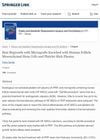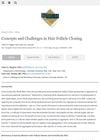 113 citations,
June 2019 in “F1000Research”
113 citations,
June 2019 in “F1000Research” Scarless healing is complex and influenced by genetics and environment, while better understanding could improve scar treatment.
38 citations,
February 2021 in “Journal of Investigative Dermatology” Aging slows wound healing due to weaker cells and immune response.
35 citations,
October 2011 in “Medicine and science in sports and exercise” Muscles can make their own androgens, which may help muscle growth.
 28 citations,
April 2023 in “Stem cell research & therapy”
28 citations,
April 2023 in “Stem cell research & therapy” Tiny vesicles from stem cells could be a new treatment for healing wounds.
24 citations,
March 2020 in “Cells” Natural small molecules can help treat diseases by activating or inhibiting the Wnt pathway.
 15 citations,
July 2021 in “Bosnian Journal of Basic Medical Sciences”
15 citations,
July 2021 in “Bosnian Journal of Basic Medical Sciences” Stem cell therapy is promising for treating various health conditions, but more research is needed to understand its full potential and address challenges.
14 citations,
November 2019 in “Mediators of inflammation” IL-6 from stem cells helps repair skin and grow hair.
13 citations,
July 2014 in “Cell stem cell” Stem cells can be primed to respond faster to injury through mTORC1 signaling, enhancing muscle regeneration.
12 citations,
January 2021 in “Springer eBooks”  10 citations,
May 2021 in “Stem Cell Research & Therapy”
10 citations,
May 2021 in “Stem Cell Research & Therapy” Bone marrow-derived stem cells improved healing and reduced scarring in second-degree burns in rats.
 7 citations,
March 2022 in “Frontiers in Genetics”
7 citations,
March 2022 in “Frontiers in Genetics” The research found specific genes that may cause longer hair in Tianzhu White Yak.
7 citations,
May 2021 in “Frontiers in Pharmacology” PRP shows promise for treating female hair loss but needs more research.
 5 citations,
January 2022 in “Molecular Medicine Reports”
5 citations,
January 2022 in “Molecular Medicine Reports” Pine bark extract helps mice grow hair by reducing inflammation and boosting growth factors.
 4 citations,
December 2022 in “International Journal of Molecular Sciences”
4 citations,
December 2022 in “International Journal of Molecular Sciences” Zinc is crucial for skin health and treating various skin disorders.
1 citations,
January 2024 in “International journal of molecular sciences” TRPV4 helps cells repair tissue and reduce scarring by controlling calcium levels.
 1 citations,
May 2022 in “IntechOpen eBooks”
1 citations,
May 2022 in “IntechOpen eBooks” Obesity leads to physical, metabolic, reproductive issues, higher healthcare costs, and mental health problems.
 1 citations,
July 2021 in “Journal of Skin and Sexually Transmitted Diseases”
1 citations,
July 2021 in “Journal of Skin and Sexually Transmitted Diseases” Lipedema is a painful fat disorder in women that's hard to treat, often worsens with hormonal changes, and requires symptom-focused therapies.
 August 2024 in “Stem Cell Research & Therapy”
August 2024 in “Stem Cell Research & Therapy” New regenerative therapies show promise for treating hair loss.
 June 2024 in “International Journal of Nanomedicine”
June 2024 in “International Journal of Nanomedicine” CRISPR/Cas9 has improved precision and control but still faces clinical challenges.
March 2024 in “Journal of functional biomaterials” A kimchi-derived bacterium could help whiten teeth and prevent bad breath.
November 2023 in “IntechOpen eBooks” Arsenic exposure from contaminated water severely damages the skin, causing hair loss, pigmentation changes, irritation, and can lead to skin cancer.
 August 2023 in “Stem Cell Research & Therapy”
August 2023 in “Stem Cell Research & Therapy” Using adipose-derived stem cell media with minoxidil may help regrow hair in men with hair loss.
 February 2023 in “Laboratory Animal Research”
February 2023 in “Laboratory Animal Research” Cudrania tricuspidata and Sargassum fusiforme extracts improved hair growth in mice by affecting growth-related genes.
 January 2023 in “Journal of surgery and research”
January 2023 in “Journal of surgery and research” New treatment effectively reverses hair thinning in most patients with mild side effects.
 January 2022 in “Springer eBooks”
January 2022 in “Springer eBooks” Using micrografts with stem cells and platelet-rich plasma can safely and effectively help regrow hair.
 January 2014 in “Hair transplant forum international”
January 2014 in “Hair transplant forum international” Hair follicle cloning is possible but faces many challenges before it can replace traditional hair transplants.
 April 2011 in “한국생물공학회 학술대회”
April 2011 in “한국생물공학회 학술대회” Lotion with fucoidan from brown seaweed improved skin and reduced allergy symptoms in mice with dermatitis.
 24 citations,
January 2019 in “Biomaterials Science”
24 citations,
January 2019 in “Biomaterials Science” The shape of fibrous scaffolds can improve how stem cells help heal skin.
32 citations,
December 1965 in “The Lancet”  67 citations,
February 2020 in “Journal of Ginseng Research”
67 citations,
February 2020 in “Journal of Ginseng Research” Korean Red Ginseng has beneficial components that help with stress, immunity, fatigue, memory, blood flow, and disease protection.



















